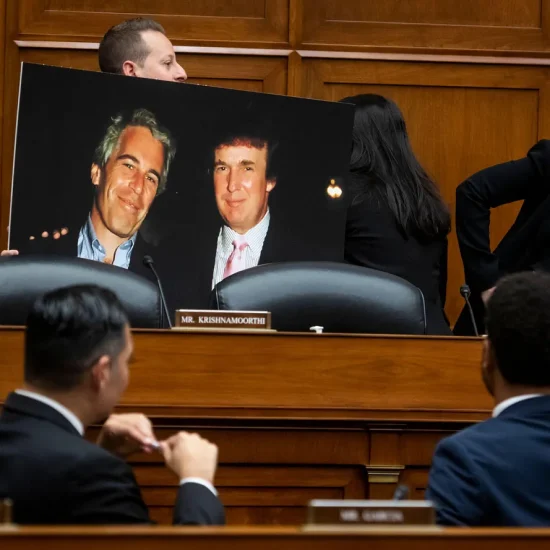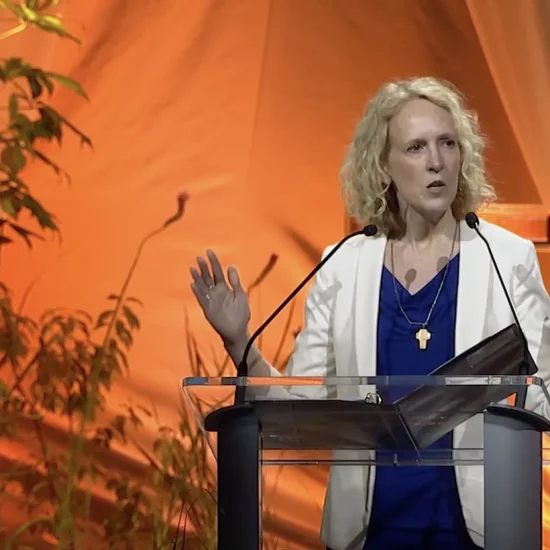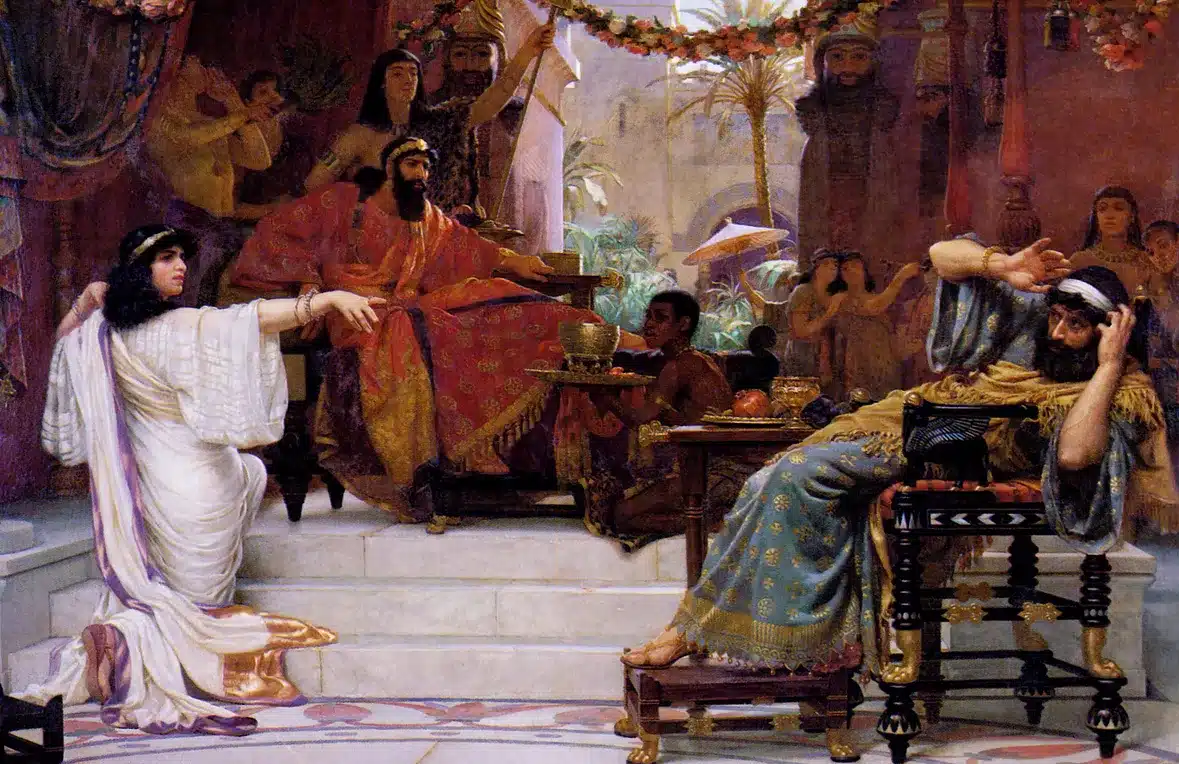
Doug Mastriano’s campaign is in trouble. With a little more than a month until election day, the polling average in the Pennsylvania gubernatorial race puts the Republican nominee more than 10 points behind Democrat Josh Shapiro. Mastriano hasn’t even led in a single poll.
Additionally, the candidate seeking the highest office in a state of nearly 13 million people hadn’t aired an ad on television since May until this week, and he isn’t receiving support from groups like the Republican Governors Association (a sign they think their money is better spent in states where the Republican might actually win). Meanwhile, Shapiro has blanketed the state with more than 23,000 TV ads and numerous mailings. This imbalance will continue over the next month since Shapiro has $13.5 million in his campaign account compared to less than $400,000 for Mastriano.
Facing what seems like insurmountable odds and the cold shoulder even from key national Republicans, Mastriano’s campaign last week decided to try a Hail Mary: prayer.
The Mastriano campaign urged supporters to join in “40 days of fasting & prayer” from Sept. 9 until election day on Nov. 8. The campaign said the goal was “interceding for our elections, our state, & our nation.” And the campaign graphic for this effort included Isaiah 58:12 about being “known as a rebuilder of walls and a restorer of homes.” The campaign started posting a daily prayer guide on the campaign’s Facebook page (the main way Mastriano tries to reach voters), but stopped posting them and even deleted the earlier ones for an unstated reason after the Philadelphia Inquirer reported on the effort by the “cash-strapped campaign” to seek “divine intervention.”
“We’re having the 40 days of fasting,” Mastriano’s wife Rebbie said in a campaign livestream with him last week (a few minutes before she ended the campaign update with a prayer). “And that’s crucial because what we’re fighting against is actually beyond and behind the scenes, behind people. So, in doing that prayer and fasting, we’re breaking things that are obstacles for us. So, we need that extra power.”
While the prayer guides disappeared, Mastriano continues to focus on religious messaging as he seeks political salvation in the ballot box. Like campaigning in church services, putting a Bible verse on his campaign signs, and using Steven Curtis Chapman music at rallies. On the first day of the prayer focus last week, he posted a meme on his campaign Facebook page declaring his candidacy was “for such a time as this.” His campaign is also selling a watercolor painting of him with his campaign verse (John 8:36), and posted a message from the artist explaining she painted it after meeting Mastriano because “she instantly knew Doug was made for such a time as this in Pennsylvania.”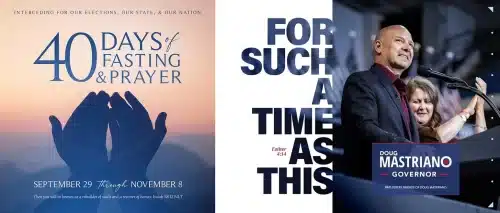
Although Mastriano stands out for his extreme embrace of Christian Nationalist ideas, his co-opting of Esther 4:14 for his campaign is actually fairly standard campaign fare. Once you start listening, the invoking of the biblical passage story jumps out on a regular basis.
So, in this issue of A Public Witness, we listen to the Esther moments showing up all the time in our politics today. Then we look in our Bibles to see what the passage actually teaches before offering a warning about the political misuse of this popular verse.
Get cutting-edge reporting and analysis like this in your inbox every week by subscribing today!
Time & Time Again
Mastriano is hardly the only politician invoking the idea of his campaign being “for such a time as this.” Nor are Republicans the only ones employing this self-referential rhetoric of being chosen. Sometimes people specifically mention the biblical story of Esther. And people often do something the scripture doesn’t by invoking God. Here’s a quick survey of examples from just the past year:
- Last October, Ty and Charlene Bollinger led an anti-vaccine conference. Labeled among the nation’s dozen biggest superspreaders of vaccine misinformation, Charlene told NPR, “We have countless testimonies of people that are alive today because of our work, and this is straight from heaven. God has put us on this Earth for such a time as this.”
- As Eric Adams campaigned last fall for New York mayor, he declared shortly before his victory, “You don’t have to be a Christian to know what Esther said in 4:14, God made me for such a time as this.” Mayor Esther — err, Adams — has continued to make this declaration in office.
- Greg Locke, a Tennessee preacher who rose to prominence challenging COVID-19 health measures and the 2020 election results, late last year invited a special guest to speak at church: actor John Schneider, who played Bo Duke on The Dukes of Hazzard. Schneider complained about flu shots and urged the congregation to fight back: “We are born for such a time as this. God is calling you to do something. … We have a country to get back. And if that fails, we have a country — yes, I’ll say it — to take back.”
- Kayleigh McEnany published her memoir last year documenting her time in the Trump administration, including as White House press secretary for the last nine months of the Trump presidency. The title of the book by the Fox News contributor? For Such a Time as This: My Faith Journey Through the White House and Beyond.
- In February, a Missouri state representative pushed for her colleagues to vote for a highly-gerrymandered congressional redistricting map. She told those gathered in the Capitol for a rally: “This is such a time as this. I believe God called us here to serve with your blessing.”
- At a rally in March to criticize local public schools in Virginia for teaching students about racism and sexuality, an activist declared, “God has equipped each of us for such a time as this. What an honor, privilege, and blessing to be able to fight for freedom, as our founders and forefathers once did right here in this great state. Let’s reclaim our culture for truth, family, and freedom.”
- Campaigning for another term, U.S. Rep. Madison Cawthorn told supporters at a rally with Donald Trump in April, “We can decide that God chose us to live in this time. And just like Queen Esther, we were chosen for such a time as this.” But unlike Esther, Cawthorn lost the vote the next month amid controversies about a nude video, sexual harassment allegations, and multiple legal infractions.
- As Minnesota State Rep. Tama Theis offered her farewell speech in the chamber, she said she was surprised she even came into office: “I trusted God that this was where I belonged, and I often relied on Esther 4:14, you were born for such a time as this.”
- As Tennessee State Rep. Terri Lynn Weaver announced her reelection campaign in May, her campaign statement declared, “Terri Lynn is a singer/songwriter, mother, and grandmother who is passionate about her faith in Christ and fulfilling her purpose and calling for such a time as this by representing her district in Nashville.” However, after seven terms in office she instead found herself rejected like Vashti.
- At a ReAwaken America Tour (RAT) event in May, Mark Burns, a Pentecostal preacher in South Carolina running for U.S. Congress, told people it was time to fight Democrats and “fake Republicans” like Sen. Lindsey Graham: “We’re under demonic attack. It is a divine appointment that God has appointed you for such a time as this.” At another RAT event in August, emcee Clay Clark brought people on stage to pray for Eric Trump and then declared, “I believe that God has chosen the Trump family for such a time as this to fight for us.”

Screengrab as self-proclaimed “prophets” pray over Eric Trump at a ReAwaken America Tour event on Aug. 12, 2022, in Batavia, New York.
- Mark Sherwood, a former member of the Christian bodybuilding group the Power Team, sought the Republican nomination this year against Oklahoma Gov. Kevin Stitt. He said he ran after praying and realizing “my life was set up for such a time as this.” But this muscular would-be Esther lost in June.
- As former U.S. Vice President Mike Pence campaigned for Arizona gubernatorial hopeful Karrin Taylor Robson in July, he declared, “Arizona needs Karrin Taylor Robson in the statehouse for such a time as this.” Robson lost, so apparently the state is now doomed without their Esther.
- Also in July, a candidate for the county board of commissioners in Oakland County, Michigan, told a local radio station that she was running because “I owe it to my children, my community, and my God to be faithful to this call to serve for such a time as this.” That time didn’t last long. She lost the next month.
- After voters in Kansas overwhelmingly rejected an anti-abortion constitutional amendment, some activists who didn’t like the result pushed for an election “audit” to try and prove fraud. The activist who succeeded in getting nine of the state’s 105 counties to recount their votes explained her effort: “I have never done an audit like this, but I believe that God has put us all here for such a time as this to stand up and fight for our nation.” She raised nearly $120,000 to fund the recounts, which confirmed the amendment’s defeat.
- Ahead of a local school board election in August in Santa Rosa, Florida, one candidate told a local radio station, “School security is of paramount concern in today’s culture. My extensive experience and training in dealing with international terrorism has prepared me for such a time as this.” This anti-terrorism Esther advanced to a runoff election in November.
As these examples and many others reveal, just about any time can be such a time for almost anyone. But not all times fit the actual biblical story.
The Biblical Story of Esther
For those unfamiliar with the biblical narrative, Esther becomes the Persian queen almost by accident and despite her Jewish identity (2:1-10). Her new husband, King Ahasuerus (also referred to as King Xerxes), is convinced by one of his advisors, Haman, to order a massacre of all the Jews in the empire out of their perceived disloyalty, embodied in the refusal by a man named Mordecai to bow down before Haman (3:3-11).
Mordecai just happens to be the man who raised Esther as his own daughter after the death of her parents. He also spoiled a plot to assassinate the king by reporting it to her (2:21-23). When he gets word of the planned massacre of the Jews, he implores Esther to intercede with Ahasuerus (4:6-8). But she hesitates, fearing the king’s wrath (4:11).
That prompts Mordecai to reply to Esther, “Do not think that because you are in the king’s house you alone of all the Jews will escape. For if you remain silent at this time, relief and deliverance for the Jews will arise from another place, but you and your father’s family will perish. And who knows but that you have come to your royal position for such a time as this?” This speech inspires her to act.

Rembrandt van Rijn’s 1660 painting Ahasuerus and Haman at the Feast of Esther. (Public Domain)
A wild turn of events wraps up the story. Mordecai is honored rather than hung (6:10-11). Haman is executed by the King, though not for a crime he actually commits (7:7-10). And while the King cannot formally renounce his decree, the Jews are empowered to defend themselves from attack and successfully defeat the sons and followers of Haman who sought their demise (8:1-17).
Thus, Esther is the heroine whose reluctant courage but steadfast trust saves her people. Through her decisions and actions, justice is served and truth prevails. She appears chosen for the occasion, perhaps even divinely (though God doesn’t actually appear in the text). It’s the type of starring role craved by most leaders on the national stage.
Of course, their version of the story conveniently leaves out how Esther became queen because her predecessor, Vashti, in good feminist fashion refused to be reduced to a sexual object on the orders of a drunken king (1:10-12). It ignores Esther’s not-quite-innocent role in Haman’s demise (she doesn’t correct the king’s misperceptions, see 7:8). And such a narrative can gloss over the gory violence that still results (9:16). It’s a far more complicated story than our politicians (and sometimes even our pastors) like to tell.
Help sustain the ministry of Word&Way by subscribing to A Public Witness!
We’re Not All Esthers
Given the potential power of the story, perhaps we shouldn’t be surprised by politicians invoking the text. But often the version told diverges radically from the biblical account. For instance, both “prosperity gospel” preacher Paula White-Cain and then-Secretary of State Mike Pompeo compared Donald Trump to Esther. But we wonder if they’ve actually read the text. After all, the story involves an unstable ruler who cycles through wives and listens to a bigoted advisor (not to mention the whole running an international beauty contest thing). But they read that and their first thought was Trump is Esther?
While not all efforts to christen one as a modern Esther are quite as laughable, when politicians give themselves that title they neglect how their quest for power and participation in our political ruling structures contrasts with Esther’s status as an “other” in Persian society. And while Esther struggled with the potential implications of disclosing her religious identity, those identifying with her story today quote the famous verse to signal their faith commitments as a reason to gain political support.
“Some public figures appeal to biblical examples as a badge of Christian identity. For example, Doug Mastriano almost always gives chapter and verse when his marketing cites Scripture. That’s a way of identifying with potential voters who want their version of Christianity to have influence in public life,” Greg Carey, a biblical scholar at Lancaster Theological Seminary and author of Using Our Outside Voice: Public Biblical Interpretation, told us. “When public figures identify with Esther 4:14, they’re conveying a sense of public danger and presenting themselves as the hero of the moment.”
But that quest for valor and desire to be the savior is an odd fit with how the Book of Esther unfolds.
“Esther does not declare herself to be the person ‘for such a time as this.’ This phrase is uttered by her uncle, Mordecai, who is trying to get Queen Esther to risk her life to save the Jewish people from an unprovoked attack through planned genocide. Esther is put in a difficult position of being caught between her husband, the king (political power), and her people,” Lisa Davison, professor of Hebrew Bible at Phillips Theological Seminary and author of More Than a Womb: Childfree Women in the Hebrew Bible as Agents of the Holy, told us. “As a woman in a ‘man’s world’ and a member of a minority people, she works to thwart the genocidal desires of Haman within the confines of the system. Ultimately, Esther is not trying to gain power and prestige. Her motivation is to protect a minority group from being slaughtered.”
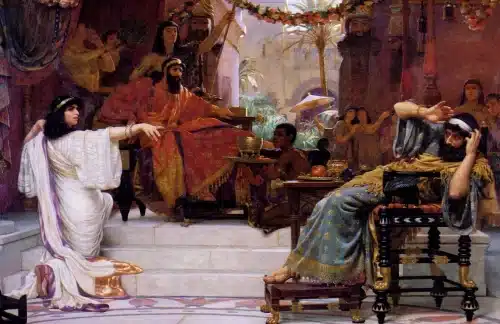
Ernest Normand’s 1888 painting Esther Denouncing Haman. (Public Domain)
Esther is an inspiring biblical figure. She uses her unanticipated political power to seek justice and save lives. Her surprising rise to influence, which she hesitates to use, makes this an impressionable lesson about the capability each of us has to serve God’s purposes, if only we will be humble, patient, and faithful.
Lamentably, many of our public leaders citing her story contradict it with their own actions. They consecrate themselves as they strive to gain power. Once in office, they use their newfound authority to advance their own ideological agendas. That doesn’t necessarily make them bad people. But it also means they’re not necessarily an Esther putting their own lives at risk to save people from genocide.
Let’s not pretend that every politician is anointed by God. A victory on election day doesn’t necessarily mean God has called a politician to be a hero of biblical proportions. It may just mean “we the people” have entrusted that person to fulfill the duties of an office for a brief time. That’s a weighty enough task for such a time as this. So, perhaps like the Book of Esther, we should leave God out of it.
As a public witness,
Brian Kaylor & Beau Underwood

